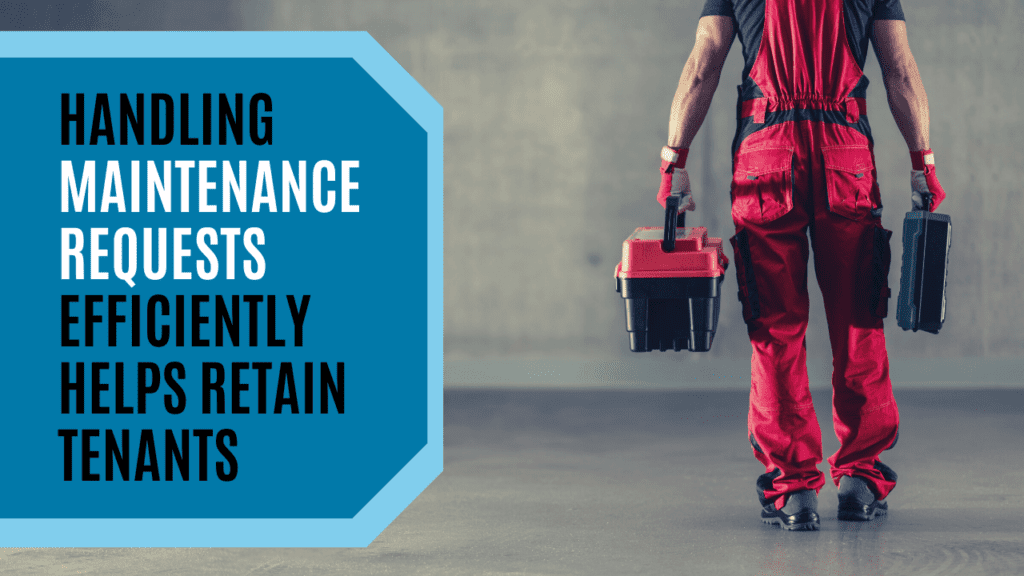
Tenant retention should be a big part of your strategy when you’re renting out San Diego homes. Keeping good tenants in place will ensure your cash flow is consistent. It will cut down on vacancy lost and keep turnover costs to a minimum. Your entire investment experience will be more stable, and you’ll waste less time marketing and showing your home again, and looking for new tenants.
A number of things contribute to good tenant retention. You need to communicate well with your residents, establish expectations for the tenancy, and be available to them when you need them. Rental increases should be kept at a reasonable level so you don’t chase them out of your property and into another rental home.
Perhaps one of the most important factors in whether you retain or lose a tenant is maintenance.
Tenants who don’t feel like their maintenance requests get the appropriate amount of attention will be unlikely to stay in place and renew their lease agreement. But, if you can demonstrate that you care about maintenance requests, you’re probably going to keep your tenants.
Maintenance is a big part of your retention strategy. Let’s talk about some ways you can ensure you’re handling maintenance requests efficiently and keeping your residents happy.
Handling Emergency Maintenance Requests in San Diego Rental Homes
Emergencies are sudden and unexpected. It’s easy to forget all about any process that might be in place when there’s a fire or a flood or something dramatic that affects the safety of your tenants and the habitability of your home.
A process is important, but before you can put that together, you’ll want to be sure your tenants understand what emergencies are.
Anything can seem like an emergency. That broken screen or the clogged garbage disposal – inconvenient, but probably not an emergency-level repair.
A toilet that’s not flushing right is actually not an emergency if there is another toilet or two in the property.
Be specific about what qualifies as an emergency, because those are the calls you’ll be getting in the middle of the night or over the weekend or while you’re on vacation.
Generally speaking, emergencies involve floods, fire, or sewage. An emergency would include:
- No heat in the winter.
- No running water.
- A leaking water heater.
- A tree falling through the roof.
- A door that will not lock.
Instruct your tenants to call you when an emergency repair is needed. You can’t collect these reports via email because it might be too late to do anything by the time you get the notification. A phone call is best when immediate action is needed.
What will you do when that emergency is reported?
First, make sure the emergency doesn’t have an opportunity to get worse. If a pipe has burst inside the house, turn off the water. It helps if your resident knows where to find critical things such as the water and gas shut-offs.
Once the initial damage is done and the crisis is stopped, the appropriate restoration methods can be undertaken. This is where the damage will be assessed and some context will be given to the overall situation. Water restoration companies can be called, for example. Insurance claims can be initiated.
You’ll need to know who to contact and how to deal with the immediate response according to the situation. Stay calm, keep your tenants calm, and handle things one at a time.
How to Handle Routine Repairs in San Diego Rental Homes
Routine repairs do not require a phone call. In fact, you should opt for a written request rather than a verbal one.
For tenants, these routine issues are likely to feel inconvenient. They will still expect an efficient response, and if you’re interested in retaining those tenants, you’ll want to act quickly. Let them know that the problem is being taken care of and you have a plan to fix or replace whatever is needed.
At Chase Pacific, we’re a San Diego property management company, which means we have access to great technology. It provides our renters with an online tenant portal, where residents can make routine requests when something is wrong or needs attention. These repairs are often responded to in a day or two, so nothing is delayed.
We like having written repair requests because:
- It allows tenants to make requests on their own time. They don’t have to worry about waiting until normal business hours or bothering you in an evening.
- It documents when the request came in.
- It allows tenants to be as detailed as possible in describing what is wrong. Pictures and videos can even be uploaded in tenant portals to show what’s going on.
- There’s a record of how the repair was handled. You have a written timeline and a sequence of events that can protect you if a tenant claims a repair was not made. It also helps you plan for when preventative maintenance may be needed going forward. If you’re trying to decide when to replace a refrigerator, for example, you can review how often you’ve had to fix it in the last year or two.
If you’re not already working with a San Diego property manager, you might not have the resources necessary to provide an online portal. But, you can still accept the request in writing. Ask tenants to email you or send a text message. You can use any messaging app, really, to collect and organize maintenance requests.
Remember to respond to those routine repairs with the same sense of urgency you would an emergency. It’s the best way to retain your tenants – with responsive, active maintenance policies.
Document Your Maintenance Process
Once you have established how you will respond to emergency and routine repair needs – put that process in writing. When you have a written process, you know it’s consistent and you can refer to it when you want to double-check something, make improvements, or update how things are done.
Put this documented maintenance request process in your lease agreement. Discuss this section of the lease agreement when you’re discussing the lease with tenants. The lease is also the right place to outline who is responsible for which items when it comes to maintaining your property. As the landlord, you’ll be responsible for maintaining the major systems and functions of the home. You’ll have to keep the air conditioning, heat, plumbing, and electric in good condition.
There are things you can expect from your tenants, however, and those should be referenced in the lease agreement. For example, to protect your HVAC system, have your tenants change the air filters regularly. You can also require that they change any light bulbs or batteries in remotes.
One thing to be absolutely clear about is that you want to be notified right away if something breaks or needs maintenance. Sometimes, tenants will hesitate to report maintenance issues. They’ll worry that they’re going to get blamed. Maybe they won’t want to bother you for a repair that they see as unimportant.
But, deferred and unreported maintenance is always more expensive than an immediate response, however. Write into the lease agreement that tenants are responsible for reporting maintenance immediately.
Build Relationships with Licensed and Insured Vendors
 You cannot maintain your property and retain your tenants without an excellent vendor network.
You cannot maintain your property and retain your tenants without an excellent vendor network.
A team of reliable and professional vendors and contractors will help you maintain the property and protect its condition. You need a list of preferred workers.
Always establish these relationships ahead of time. When there’s an inch of standing water in your rental property, you don’t want to be contacting a plumber for the first time. You want someone who knows you and has been to your property before.
Another benefit to working with a team of preferred vendors is that they can help with preventative maintenance. When you contract for ongoing services, you will have someone in your contacts who you can get in touch with right away. For example, if you have your HVAC system serviced every year, you’ll know exactly who to call if the heat goes out or the thermostat stops working.
Always work with licensed and insured vendors. A handyman is fine when you need someone to paint or change locks or re-set garbage disposals. But, when there’s a major maintenance concern at your home, make sure you’re working with someone who can show workers compensation insurance and the proper licensure. This will reduce your risk and ensure a high quality of work.
A good maintenance response leads to a better rental experience for everyone. Don’t handle problems as they come up. Instead, have a documented system in place that you can share with your tenants so everyone is on the same page. Maintaining your property requires a team approach. You’ll find that with a good maintenance plan, your tenants are willing to stay in place longer. That’s good for your property and your rental income.
Would you like to hear more about our process for handling tenant maintenance requests or our ability to help you increase tenant retention? We’d be glad to tell you more. Please don’t hesitate to contact us at Chase Pacific Property Management & Real Estate Services.
